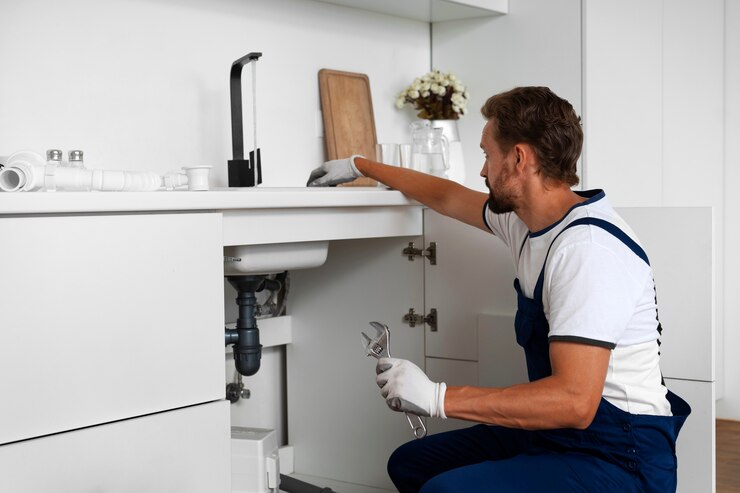Dealing with a clogged drain can be frustrating, leaving your sink or tub full of standing water. Many things can cause clogs, from greasy leftovers to sneaky hair strands finding their way down the drain. These blockages can disrupt your daily routine and even lead to unpleasant odors in your home.
Recognizing when it’s time to call a professional can prevent a bigger mess. Being prepared and knowing your options makes managing clogged drains straightforward and hassle-free.
Identifying the Cause of Clogged Drains
Understanding what causes a clogged drain is the first step in fixing it. Several common culprits are often to blame for these blockages. Hair is a frequent problem, especially in bathroom drains, where strands can easily escape during showers and combine with soap, forming stubborn clogs. Soap scum itself is another sneaky offender. It can build up over time, narrowing pipes and slowing water flow. In kitchen sinks, grease poses a significant issue. While it might seem harmless, pouring grease down the drain causes it to solidify and build up. Lastly, it’s important to watch out for foreign objects. Accidental drops of small items like jewelry or toys can obstruct water flow, making it hard to drain properly.
Knowing what might be causing the clog helps determine how best to tackle it. For instance, if hair is the issue, a plumbing snake or special hair removal tool can be more effective than a plunger. Grease clogs might benefit more from heat or specific cleaning agents to break them down. By correctly identifying the problem, you can choose the most suitable method and resolve the issue efficiently, avoiding unnecessary effort or potential damage to your plumbing.
DIY Methods for Unclogging Drains
Home remedies are often quite effective when dealing with clogged drains. Here’s a list of some easy DIY methods you can try:
1. Hot Water: For minor clogs, simply pouring boiling water down the drain can help. It can dissolve or loosen some grease and soap scum build-ups.
2. Baking Soda and Vinegar: This natural solution uses everyday items found in your pantry. Mix one cup of baking soda with vinegar and pour the combination down the drain. Cover it with a plug for about 15 minutes to let the fizzing action work on loosening up the clog, then flush it with hot water.
3. Plunging: A plunger is a handy tool for many DIY drain fixes. Create a seal around the drain with the plunger and give it a few firm pumps. The pressure can help looser clogs dislodge and clear the way.
It’s essential to handle these methods safely. When using hot water, ensure it doesn’t splash onto the skin to avoid burns. Use an appropriate amount of baking soda and vinegar to prevent overflows. When plunging, make sure the plunger is firmly applied to maximize suction. Trying these approaches addresses the clog directly and can often restore normal flow without calling in the experts.
When to Use Chemical Drain Cleaners
Chemical drain cleaners can be a go-to solution when faced with stubborn clogs that resist simple methods. However, it is important to weigh the pros and cons before reaching for these products. On the plus side, chemical cleaners are convenient and can quickly dissolve tough blockages, effectively addressing many clogs involving hair or grease buildup. They create a chemical reaction that breaks down the material, causing the blockage.
Despite their effectiveness, chemical cleaners have some downsides. They are often harsh and can damage pipes over time, particularly if used frequently or incorrectly. They can also pose safety risks if not handled properly, such as emitting fumes that shouldn’t be inhaled or coming into contact with skin.
When choosing a chemical cleaner, read the labels carefully. Pick products designed for the type of pipes in your home and follow the instructions closely. Safety gear like gloves and goggles are a good idea to protect yourself from harmful chemicals. Using these cleaners responsibly ensures that you fix the clog without causing further damage to your plumbing system.
Knowing When to Call a Professional
Sometimes, clogged drains can be more complex than they appear, and DIY methods might not do the trick. Persistent clogs, water backing up, or foul odors can signal deeper issues within your plumbing system. Major blockages might require equipment and expertise beyond the scope of home remedies. Attempting to handle these on your own can lead to burst pipes or more severe water damage, so it’s essential to recognize when expert help is necessary.
Calling in a professional plumber can make all the difference in such situations. Licensed plumbers have the tools and experience to effectively diagnose and treat complex clogs. They can spot issues lurking deeper within your system, preventing future problems. Professionals can handle tricky clogs without harming your plumbing, providing peace of mind and long-term solutions.
While it might seem like an extra expense, hiring a plumber can save you from bigger problems. They bring knowledge and reliability, ensuring your system remains in good health. When DIY efforts aren’t enough, trusting a skilled plumber is the right call.
Conclusion
Clogs in your drains are not just a hassle; they can disrupt your daily life and cause major headaches. Approaching them with the right tools and information is essential to keeping your plumbing in shape. From identifying the source of the clog to choosing between DIY methods and calling in a professional, handling these issues effectively involves skill and judgment.
For those living in the Dallas – Fort Worth area, H.C. Edwards Plumbing is equipped to handle all your plumbing needs with precision and care. If dealing with persistent clogs is becoming a regular chore, reach out to us for expert guidance and reliable clogged drain service. We are committed to ensuring your home’s plumbing functions smoothly so you can enjoy a clog-free home without stress.

